QuestionQUESTION: Hello again! Ants here with a new issue. My mouse books,the local pet shop and various online mouse forums tell me to give dehydrated mice an electrolyte formula for human babies, often specifying Paedialyte, which I found in a chemist today. But nobody tells me how much of it to administer and how. If the mouse does not take the initiative to drink by itself, should I administer Paedialyte through a syringe, like antibiotics? Is there any special technique - to avoid aspiration or to aid easy swallowing, for instance - if the amount of liquid is greater than the droplet of antibiotics they get? What should be the position of the mouse? In general, how should I go about rehydrating mice, and for how long? Why is one mouse dehydrated when its companions are not?
Another related issue is that some online forums say that antibiotics remove the bacterial flora in the gut of mice, so it must be reintroduced through yoghurt to avoid - again - unsuccessful digestion and hence dehydration. I am eager to hear your thoughts about that.
Incidentally, concerning Greta (remember?), the vets were utterly confused when we brought her in and still cannot decide if Greta is a female with a mysterious lump - for which I must continue with the Baytril - or a monorchid male misidentified as a female in the pet shop. They have told me to separate Greta from the other mice and wait three weeks to see if any of them give birth, and meanwhile to keep them informed about any developments. Basically the vet we saw had to get a 'second opinion' and even the second vet was utterly confused as to whether Greta was male or female. We are none the wiser.
As always I appreciate your advice and I apologise for these long and bizarre questions. Thanks very much and have fun with your tiny friends. -Ants.
ANSWER: Dear Ants,
It's funny, when I first read that Greta was getting a 'swollen rear' I thought to ask if she was perhaps a he-- but of course the one lump fooled me. I would think the difference between a monorchid male and a mouse with an abscess would be very clear-- mouse testicles are very soft, while as far as I know, abscesses are hard. But I'm the first to say your vet knows far better than I do. How interesting. Well if it's a mutant male (Greg, perhaps?), maybe it can't fertilize a female either, so it could still live with its pals..
As for the dehydrated mouse, I don't know why one mouse gets dehydrated and the others don't, any more than I know why I used to get dehydrated as a child and my sisters didn't. Something genetic, I suppose, unless this mouse has trouble with the water bottle. I'm going to assume you mean a syringe for oral ingestion and not injection. I'm also assuming it is not an infant? The adult mouse will have to be held by the scruff of its neck and fed a drop at a time, kicking and squirming. If it is a baby it will be easier, and the baby will accept the drop better, also letting you know when it is done, by refusing.
Not being a vet, I don't know how many drops of water a mouse needs per day.. though by the amount they leave on my clothing (sigh), more than one might think! Here is the url for a vet familiar with mice who may be able to help:
http://exoticpets.about.com/mbiopage.htm
Again, a vet knows better than I do about the intestinal flora of a dehydrated mouse; I know that antibiotics do kill the 'good' bacteria in anyone's intestines, and it is helpful to eat yogurt or ingest acidophilus to replenish the flora. Most people and mice get along fine without this replenishment, but it certainly can't hurt to give a mouse yogurt, and it makes sense that a dehydrated mouse would have more trouble than a healthy one; in fact it might be an easier way to hydrate the mouse, since it will probably lick fruit yogurt from your fingers.
Just as a reminder I am not a vet, nor a biologist; nor do I have any formal training with mice; thus my experience with mice is more behavioral than medical. I'm always very happy to help or confer on an issue; I just don't want to give myself expert status that I don't have.
By the way, I'm not a vet... just being silly now! Did I mention I'm not a vet?
squeaks n giggles,
Natasha
---------- FOLLOW-UP ----------
QUESTION: Hello, and thanks as always for your patience and help. Although the paedialyte has worked, we still don't know if Greta is male or female and nor do the vets. My question now is this: if one of our mice has babies from Greta the lady boy, is there any chance at all that Greta can be housed with its male progeny, who of course should never be separated from each other? I have heard of fathers and sons getting on in the same way as brothers. If there is a chance - and I know that often, even littermates eventually fight - then when should we introduce papa Greta and the male babies (new name for a ska band)? Thanks, and apologies for the constant mouse questions. We appreciate your expertise, which dwarfs ours. Fluffy squeaks - Ants.
AnswerDear Ants,
A father mouse sometimes gets along with his male offspring if they are never separated. Thus if Papa Greta were to remain with the mama mice they might get along. However, in order to reduce the number of possible litters, from twice as many as you have females, to none, you might not want to try this.
Simply putting a male in with a bunch of boys is a little risky, though if they are really little (3 1/2 weeks would be appropriate) it might work. You will notice that, after being chased, a baby will turn around and go up onto his hind legs in front of the other mouse. This means "Please don't kill me: I'm only a baby!" The little one is baring its tummy to allow the aggressor to kill it, thus awakening a protective instinct in the larger animal. If Greta stops chasing at that point (for the moment), that's a good thing. Any signs of blood and they need to be separated.
I'll have to leave the dilemma up to you.
squeaks n giggles,
Natasha

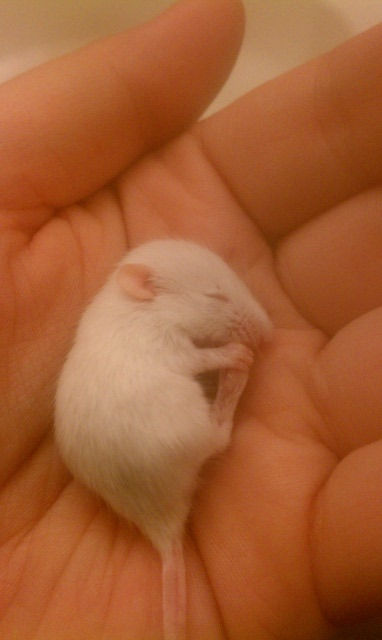 help with orphaned baby mouse
Questionbaby koda
QUESTION: My room mate got a m
help with orphaned baby mouse
Questionbaby koda
QUESTION: My room mate got a m
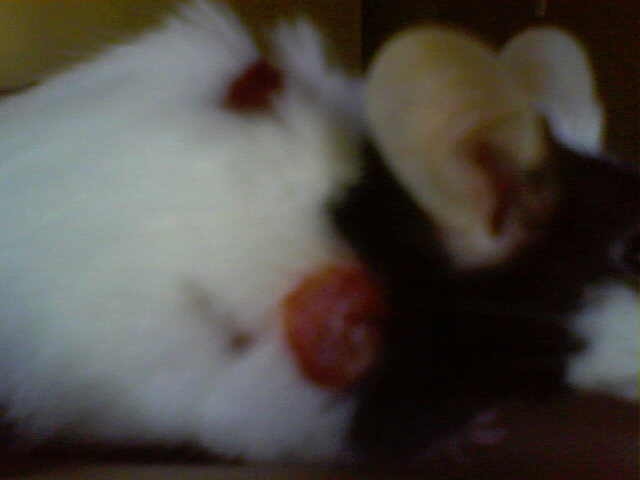 Raw Patches/ Scabs on my Mouse
Question
Spots
My pet mouse developed a red spot on her
Raw Patches/ Scabs on my Mouse
Question
Spots
My pet mouse developed a red spot on her
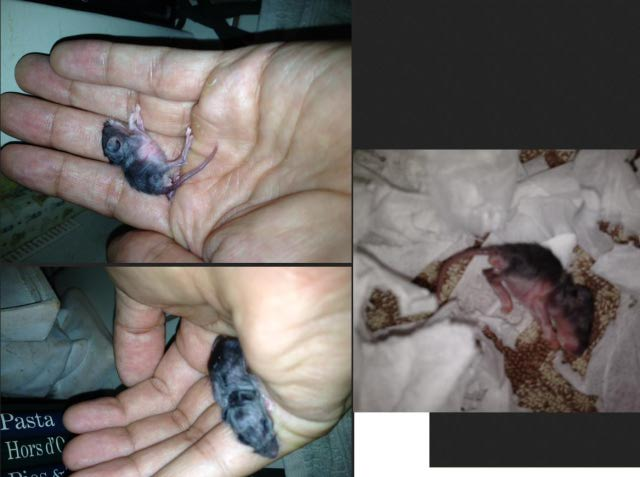 Help! Runt Orphan Not Thriving?rz
Question
Girl Runt
Hi Natasha,
We found two aba
Help! Runt Orphan Not Thriving?rz
Question
Girl Runt
Hi Natasha,
We found two aba
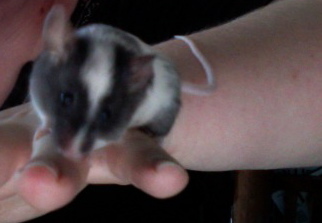 mouse with tumor on leg
QuestionDelta
QUESTION: Hi there. One of m
mouse with tumor on leg
QuestionDelta
QUESTION: Hi there. One of m
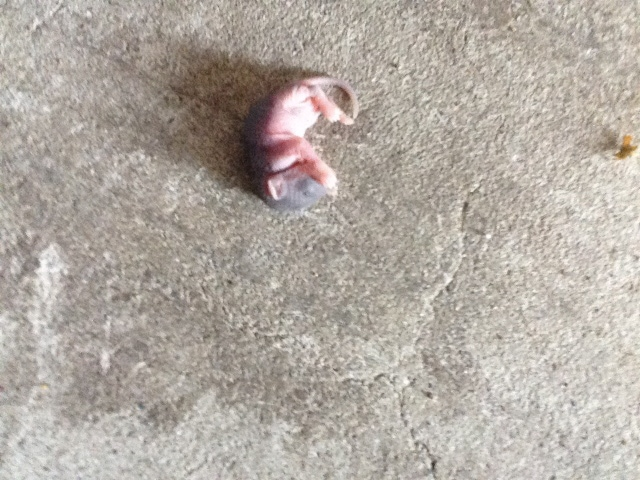 orphan infant mouse pup
Question
Mouse
Hello. We found a baby mouse on o
orphan infant mouse pup
Question
Mouse
Hello. We found a baby mouse on o